Strategies, Usage and General Attitudes
The role of locum tenens is changing, evolving from solely a short-term measure to address gaps in staffing, to now a core part of the long-term strategy within today’s healthcare. According to LocumTenens.com’s 2019 study, healthcare executives and administrators alike reported strong regard and consideration for long-term locums assignments within their facilities over the next 12-24 months.
Current Use of Locum Tenens in Healthcare Facilities

Familiarity with locum tenens in healthcare facilities
From a healthcare facility perspective, 68 percent of healthcare executives and administrators are familiar with the concept of locum tenens (and 40 percent are “highly familiar”), while 55 percent are likely to use locum tenens as a staffing option (and 29 percent “highly likely”) in the next 12 to 24 months. Of those executives, 60 percent indicated interest in filling full-time locum tenens positions, according to the survey.
Familiarity with the concept of ‘locum tenens’
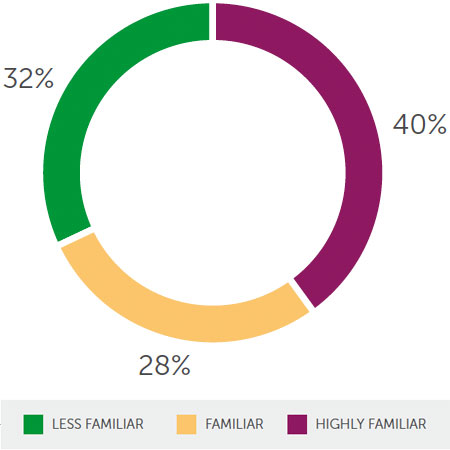
Likelihood to consider locum tenens as an employment option in next 12-24 months
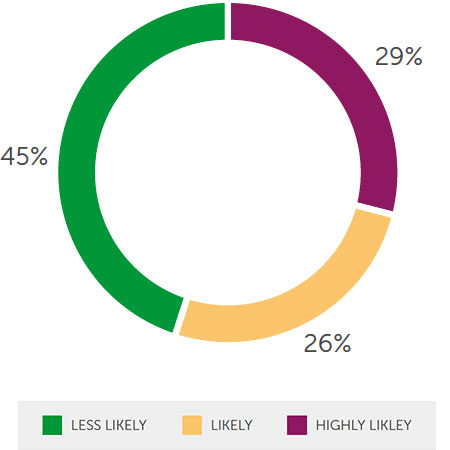
Interest in locum tenens engagements
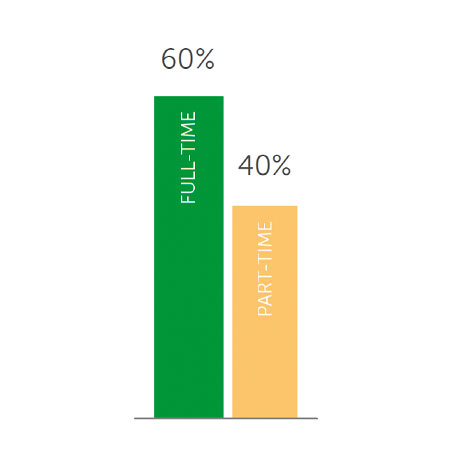
Perception of temporary healthcare staffing in facilities
Locum tenens helps healthcare facilities—whether large health systems, regional hospitals, rural facilities or clinics—improve the overall quality of care and patient experience, as well as retain physicians and advanced practitioners.
Experiences with temporary staffing engagements
Facilities overall had a high satisfaction rating for temporary healthcare staffing (96 percent scoring in 3–5 range on a 5-point scale; 68 percent scoring in 4–5 range on a 5-point scale).
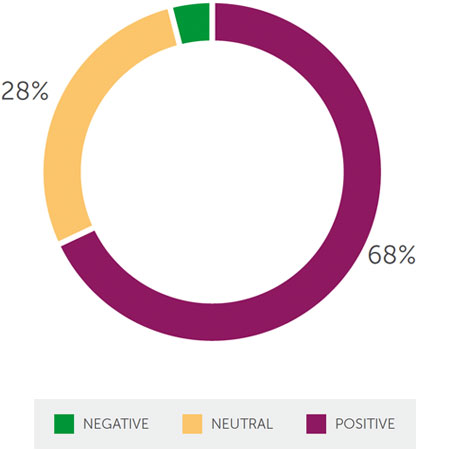
Important attributes of an ideal healthcare-related staffing company
From a healthcare executive/administrator perspective, the important attributes of an ideal healthcare staffing agency should include quality candidates and be dependable, experienced and knowledgeable.
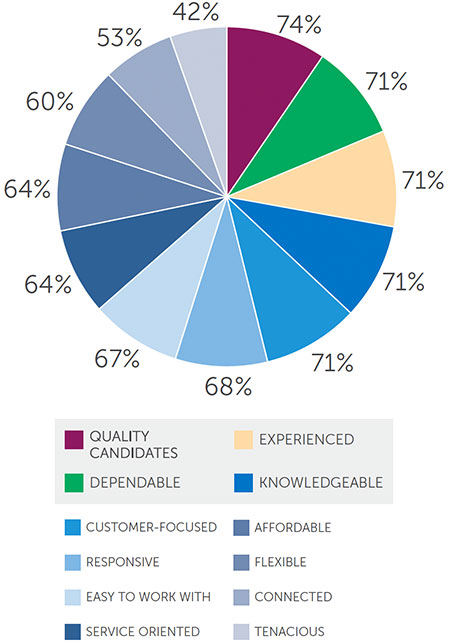
Current Use of Locum Tenens for Clinicians

Familiarity with locum tenens in healthcare facilities
The 2019 survey revealed 87 percent of clinicians (physicians and advanced practitioners) are familiar with the concept of locum tenens (scoring in the 7–10 range on a 10-point scale) and 63 percent are “highly familiar” (scoring a 9 or 10), while 60 percent indicated they are likely to consider locum tenens (and 40 percent “highly likely”) as an employment option in the next 12 to 24 months.
Of those clinicians surveyed, 57 percent have accepted temporary staffing engagements within the past 24 months for an average of three assignments. An additional 28 percent of the clinicians surveyed indicated they have not yet accepted but are interested in temporary opportunities.
Familiarity with the concept of ‘locum tenens’
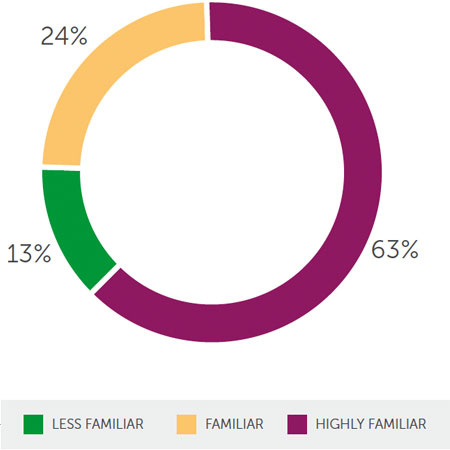
Likelihood to consider locum tenens as an employment option in next 12-24 months
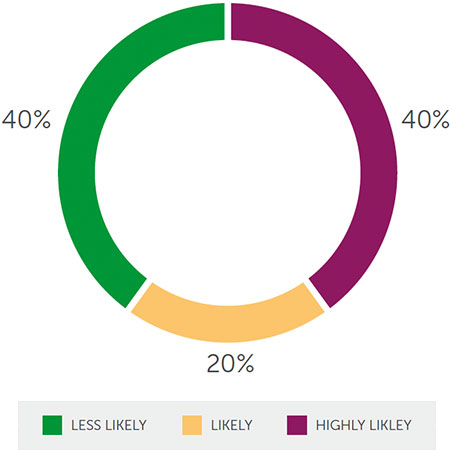
Engaged with a healthcare facility or practice as a temporary employee
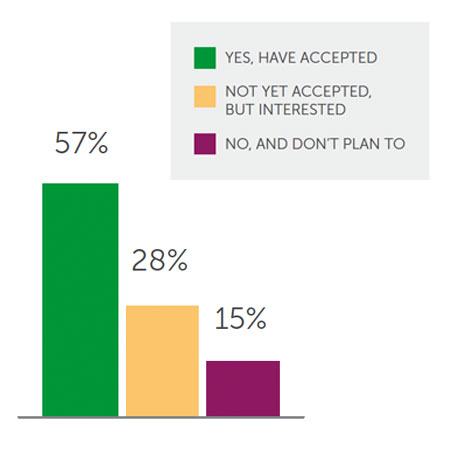
Clinicians
Clinicians ranked “I value having enough free time for my friends and family” 8.2 out of a 10-point scale and “having enough free time to pursue interests outside of work is important to me” as 7.9. Locum tenens enables physicians and advanced practitioners to have more flexibility and time to enjoy life outside of medicine.
This explains why, among the key findings analyzed, clinicians seek work-life balance (#1) more than any other job aspect, including income generation (#2) or location (#3). Healthcare executives and administrators surveyed indicated that locum tenens is an essential part of their treatment plans to add more balance and flexibility back into their facilities and staff over the next 12 to 24 months.
Burnout: A Significant Challenge for Both Clinicians and Healthcare Organizations
Lack of “balance” in physicians’ and advanced practitioners’ lives is a key contributor to burnout, which dramatically impacts the quality of care, overall patient experience and patient outcomes, as well as physician and advanced practitioner retention.
Healthcare executives and administrators surveyed indicated that locum tenens is an essential part of their treatment plans to add more balance and flexibility back into their facilities and within their own staff over the next 12-24 months. In fact, locum tenens is viewed as a critical solution to addressing physician and advanced practitioner burnout, ranking it a top three benefit (above 16 other benefits of locum tenens).
Overall, locum tenens allows permanent staff to free up hours to achieve more balance in their lives through spending more time with their family and friends, living well, exercising and pursuing activities outside the hospital or clinic.
Clinicians can also leverage locum tenens as an approach to take back control of their schedules, taking on temporary assignments on their terms and creating the time and space essential for renewal. More than half of respondents (58 percent) said flexibility was the primary reason to work locum tenens, even more than earning higher pay.
What are the primary advantages of locum tenens as an employment/staffing option?
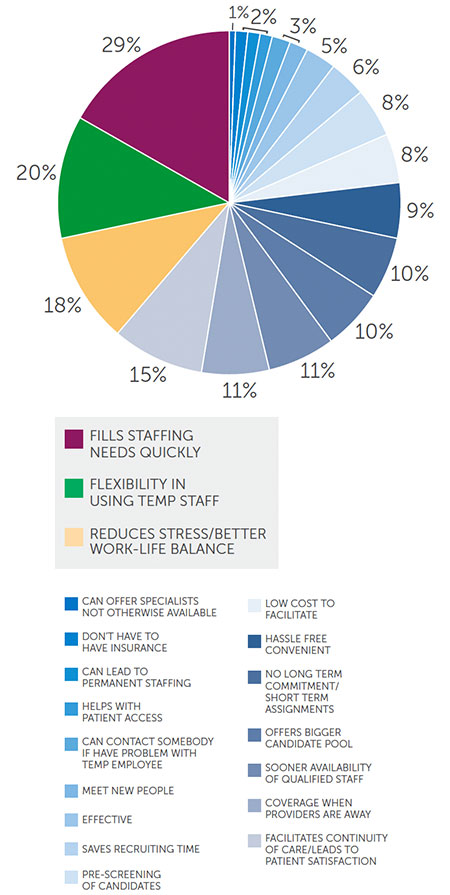
Healthcare Executive Priorities
Key priorities for healthcare executives for the next 12-24 months are improving overall quality of care, improving the patient experience and meeting an increased demand for patient care services.
- Improve quality of care (8.8/10)
- Improving patient experience/improved outcomes/greater quality (8.7/10)
- Meeting increased demand for patient care services (8.4/10)
Retaining physicians and advanced practitioners were also important (8.4 and 8.2, respectively) in their list of upcoming priorities. Work-life balance was also a priority (8.0), which coincides with the importance placed upon quality of care and retaining clinicians.
Methodology
The sample for the survey included 545 clinicians and 260 staffing administrators/recruiters across the United States. The sample was sourced from both LocumTenens.com data and strategic panel providers. LocumTenens.com provided 274 clinicians and the Panel provided 271 clinicians (N=545). The clinicians’ areas of specialization included: psychiatry, primary care, internal medicine, anesthesia, surgery, cardiology, hospital medicine, neurology, radiology, OB/GYN, emergency medicine, and gastroenterology. LocumTenens.com provided 94 facilities and the Panel provided 166 facilities (N=260). The staffing admin/recruiting sample is comprised of a representative mix of decision-making roles, functions and facility sizes.